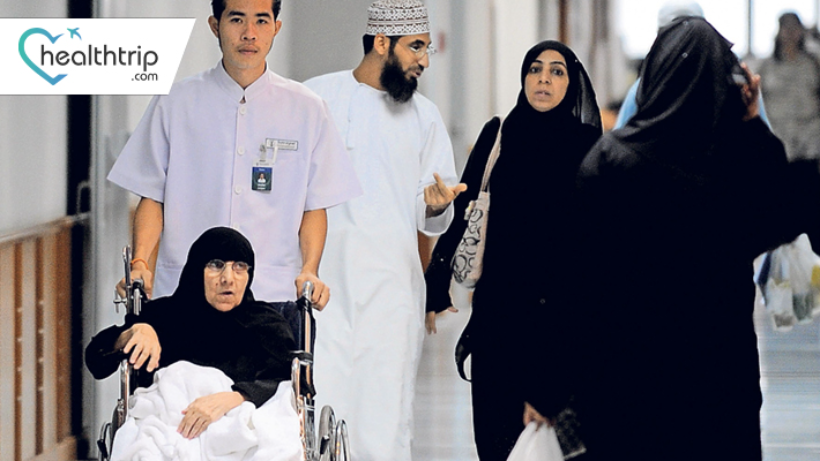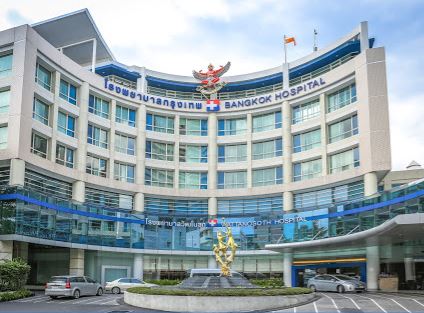Bangkok Hospital
2 Soi Phetchaburi 47 Yaek 10, Bang Kapi, Huai Khwang, Bangkok 10310, Thailand, Thailand
Bangkok Hospital Medical provider And leading medical treatment in Thailand With pride for more than 49 years, it can be considered as one of the leading private hospitals in Thailand. That has gained the trust... read more
Send EnquiryAbout The Hospital
- Bangkok Hospital Medical provider And leading medical treatment in Thailand With pride for more than 49 years, it can be considered as one of the leading private hospitals in Thailand. That has gained the trust of both Thai people And foreigners choose to use diagnosis, treatment, and rehabilitation services all along It has been accredited by the Joint Commission International (JCI), the world's largest medical standardization body.
- In addition, they have a team of interpreters who are fluent in more than 26 languages to ensure that no communication barriers will arise during medical treatment. The environment and atmosphere of the hospital are full of warmth and comfort. Fully equipped with rooms and five star facilities.
- They also provide a limousine service to transport the sick to the airport. Their services also include visa extension at the hospital as well Bangkok Hospital is committed to providing medical care and care of patients for their utmost satisfaction. They have experience in providing superior medical services and treatment.
Treatments Offered
Top Doctors
Clinical Director - Obstetrician & Gynecologist , Infertility Specialist
CONSULTS AT EXPEREIENCE :30+ years SURGERIES :
NA
Treatment Price on request
Free Text ConsultTreatment Price on request
Clinical Director - Obstetrician & Gynecologist , Infertility Specialist
CONSULTS AT30+ years SURGERIES :
NA TREATMENT COST
Treatment Price on request
Treatment Price on request
Free Text ConsultTreatment Price on request
30 years SURGERIES :
NA TREATMENT COST
Treatment Price on request
Treatment Price on request
Free Text ConsultTreatment Price on request
20 years SURGERIES :
NA TREATMENT COST
Treatment Price on request
Treatment Price on request
Free Text ConsultTreatment Price on request
35 years SURGERIES :
NA TREATMENT COST
Treatment Price on request
Treatment Price on request
Free Text ConsultTreatment Price on request
40 years SURGERIES :
NA TREATMENT COST
Treatment Price on request
Treatment Price on request
Free Text ConsultTreatment Price on request
38 years SURGERIES :
NA TREATMENT COST
Treatment Price on request
Patient Testimonials
Nearby Guest House
Team & specialisation
Center And Clinic -
- Cardiology Clinic, Cardiac Clinic Through Catheter, Pediatric Heart Clinic, etc.
- Center for Prevention and Detection for Early Cancer, Center for Internal Medicine, Oncology Center, etc.
- Orthopedic
- Accident and referral
- Health and occupational health check
- Surgery and surgery
- Dental
- Mother and child
- Caring for the elderly
- Digestive system Liver and gallbladder
- Foreign Patient Service Center
- Internal Medicine
- Rehabilitation and physical therapy
- Beauty and anti-aging
- Female health
- Male health
- Child and adolescent health
- Eyes, Ears, Nose and Throat
- Lungs and respiratory system
- Lung and respiratory diseases, allergies and asthma, ENT
- Other centers and clinics
Infrastructure

Number Of Beds
488. ICU-5

Operation Theatres
19

No Of Surgeon
20
- 256 slices of high speed computed tomography at Bangkok Heart Hospital
- Magnetic Resonance Imaging (MRI) magnetic resonance imaging
- ECMO Heart-Lung Movable Artificial Intelligence Machine
- Intelligent operating room Hybrid Operating Room Full Function
- ARTIS pheno robot x-ray machine arm Advanced technology helps in small incision orthopedic surgery
- Linear Accelerator (LINAC)
- Digital mammogram and breast ultrasound
- PET / CT Scan with Flow Motion system
- EDGE irradiation machine, new dimension of surgical radiation
- New innovation 'Bi-plane DSA' cures cerebrovascular disease without surgery.
- ROBO doctor
- Full Body 3D X-ray Machine BIPLANE IMAGING (EOS)
- Electroencephalography functional Magnetic Resonance Imaging
- Innovative spinal dissection that avoids damaging the back muscles
- Advances in technologies and minimally invasive surgery
- QRS Pelvi Center Pelvic Floor Muscle Exerciser is an alternative to pelvic floor muscle exercise.
- Tighten the skin and restore the radiance of the skin ULTHERA & THERMAGE
Technology-
Blogs

Carto Mapping and RF Ablation Treatment at Bangkok Hospital
Cardiac arrhythmias, or irregular heart rhythms, can be a life-altering condition for many individuals. However, thanks to advancements in medical technology, treatment options have expanded, and one of the most innovative approaches is Carto Mapping with RF Ablation Treatment. Bangkok Hospital, a renowned private healthcare institution in Thailand, has taken the lead in providing this cutting-edge treatment, offering patients a new lease on life.1. Understanding Cardiac ArrhythmiasBefore delving into the innovative Carto Mapping with RF Ablation Treatment, it's crucial to understand what cardiac arrhythmias are. These are abnormal heart rhythms that can lead to complications such as palpitations, dizziness, fainting, or even life-threatening situations like strokes or heart attacks. Correcting these arrhythmias is crucial to ensure the well-being of patients.1.1. Introducing Carto MappingCarto Mapping is a sophisticated technology that allows cardiologists to create highly detailed, three-dimensional maps of the heart's electrical system. This precise mapping helps identify the source of abnormal electrical signals that cause arrhythmias. This technology has been a game-changer in the field of cardiology, providing accurate insights into the heart's intricate electrical pathways.1.2. RF Ablation TreatmentOnce the source of the arrhythmia is identified through Carto Mapping, Radiofrequency (RF) Ablation is performed. This minimally invasive procedure involves the use of heat generated by radiofrequency energy to target and destroy the abnormal tissue responsible for the irregular heart rhythms. RF Ablation is highly effective, and it allows for a quicker recovery compared to traditional open-heart surgery.2. Why Choose Bangkok Hospital?Bangkok Hospital has been at the forefront of medical excellence in Thailand for over 49 years. Their commitment to providing top-notch healthcare services has earned them the trust of both Thai residents and international patients. Here's why choosing Bangkok Hospital for Carto Mapping with RF Ablation Treatment is a wise decision:1. World-Class Medical StandardsBangkok Hospital is accredited by the Joint Commission International (JCI), the world's largest medical standardization body. This accreditation ensures that patients receive care that meets or exceeds global healthcare standards.2. Multilingual SupportCommunication is key in healthcare, and Bangkok Hospital recognizes this by offering a team of interpreters fluent in more than 26 languages. This ensures that language barriers don't hinder the quality of care provided.3. Comfortable EnvironmentThe hospital prides itself on offering a warm and comfortable atmosphere for patients. Fully equipped with five-star facilities and spacious rooms, Bangkok Hospital ensures that patients feel at ease throughout their treatment journey.4. Comprehensive ServicesApart from Carto Mapping with RF Ablation Treatment, Bangkok Hospital offers a wide range of specialized centers and clinics, including cardiology, orthopedics, internal medicine, and more. This ensures that patients have access to holistic healthcare solutions.3. The Treatment PackageBangkok Hospital offers a comprehensive Carto Mapping with RF Ablation Treatment package that includes:3.1. Inclusions:Carto Mapping procedureRF Ablation treatmentPre-operative and post-operative careConsultations with expert cardiologists3.2. Exclusions:Travel expensesAccommodation (unless availing the hospital's guest house)Visa-related costs (if applicable)4. Cost BenefitsCarto Mapping with RF Ablation Treatment is a minimally invasive procedure used to treat abnormal heart rhythms. It is performed by inserting a small tube with a camera and electrodes into the heart through a vein in the leg. The camera is used to create a map of the heart's electrical system, and the electrodes are used to deliver radiofrequency (RF) energy to destroy the tissue that is causing the abnormal heart rhythms.The cost of Carto Mapping with RF Ablation Treatment in Bangkok can vary depending on the hospital, the type of treatment, and the patient's insurance coverage. However, in general, the cost of Carto Mapping with RF Ablation Treatment in Bangkok is significantly lower than in many other countries, including India.For example, the average cost of Carto Mapping with RF Ablation Treatment in India ranges from INR 2,00,000 to INR 3,00,000, while the cost of Carto Mapping with RF Ablation Treatment at Bangpakok 9 International Hospital in Bangkok starts at approximately THB 2,759,000 (approximately INR 6,10,000).4.1. Benefits of Carto Mapping with RF Ablation Treatment in Bangkok:Affordable cost: The cost of Carto Mapping with RF Ablation Treatment in Bangkok is significantly lower than in many other countries.High quality of care: Bangkok has some of the best hospitals in the world, offering high-quality care at affordable prices. Many of the hospitals in Bangkok are accredited by the Joint Commission International (JCI), which is the highest standard for international healthcare organizations.Experienced staff: Bangkok has a team of experienced and qualified cardiologists who are experts in Carto Mapping with RF Ablation Treatment.State-of-the-art facilities: Bangkok hospitals are equipped with the latest technology for Carto Mapping with RF Ablation Treatment, including state-of-the-art operating rooms and imaging equipment.Patient-centered care: Bangkok hospitals are committed to providing patient-centered care. This means that the hospitals focus on the individual needs of each patient and provide them with the highest quality of care possible.Additional benefits: Bangkok is a major tourist destination, so there are many things to see and do before and after your treatment. Bangkok is also a relatively safe city, with a low crime rate. Additionally, Bangkok is a major transportation hub, so it is easy to get to and from the city.Overall, Bangkok is a good choice for Carto Mapping with RF Ablation Treatment due to its affordable cost, high quality of care, experienced staff, state-of-the-art facilities, patient-centered care, and additional benefits.5. Leading doctors 1. Dr. Somchai WongwattanakijSpecialization: Cardiologist, ElectrophysiologistExperience: Over 20 YearsNotable Achievements: Dr. Somchai Wongwattanakij is a Pioneer in Electrophysiology2. Dr. Siripong SirinvaravongSpecialization: Interventional CardiologistExperience: Over 25 YearsNotable Achievements: Leader in Complex Arrhythmia Treatments3. Dr. Supachai PimpaSpecialization: Cardiologist, ElectrophysiologistExperience: Over 15 YearsNotable Achievements: Known for Compassionate Care4. Dr. Suthipong SoontrapaSpecialization: Cardiologist, ElectrophysiologistExperience: Over 18 YearsNotable Achievements: Committed to Advanced Electrophysiology6. Patient TestimonialsHearing from those who have experienced successful outcomes with Carto Mapping with RF Ablation Treatment at Bangkok Hospital can provide reassurance to potential patients. Here are a few testimonials:John, a 58-year-old patient from the USA, shared, "I had been suffering from arrhythmias for years. Bangkok Hospital's Carto Mapping and RF Ablation treatment gave me my life back. I can't thank the team enough."Sarah, a 45-year-old Australian, added, "The level of care and precision at Bangkok Hospital is truly world-class. Carto Mapping with RF Ablation Treatment was a game-changer for my health."In conclusion, Bangkok Hospital's Carto Mapping with RF Ablation Treatment is a testament to the hospital's commitment to offering advanced cardiac care. With a focus on patient satisfaction, top-notch medical standards, and a comfortable environment, Bangkok Hospital stands out as a leading choice for individuals seeking to regain control over their cardiac health. Don't let cardiac arrhythmias hold you back; explore the innovative treatment options available at Bangkok Hospital today.

IVF Treatment for LGBTQ+ Individuals and Couples in Thailand
IntroductionIn recent years, Thailand has emerged as a welcoming destination for LGBTQ+ individuals and couples seeking In Vitro Fertilization (IVF) treatment. The country's progressive legal framework, world-class medical facilities, affordability, and inclusive environment make it an ideal choice. In this blog, we will delve into the details of IVF treatment for LGBTQ+ individuals and couples in Thailand, covering key aspects such as legal considerations, available options, renowned doctors, leading clinics, and the cost of IVF treatment.1. Understanding IVFIn Vitro Fertilization (IVF) is a medical procedure that has revolutionized family-building possibilities. It involves fertilizing an egg with sperm outside the body, creating an embryo that is then implanted in the uterus. IVF can be an excellent option for LGBTQ+ individuals and couples looking to become parents.2. Why Choose Thailand for IVF?2.1. Legal FrameworkThailand has made significant strides in recognizing LGBTQ+ rights. The Gender Equality Act of 2015 prohibits discrimination based on sexual orientation or gender identity. Moreover, Thai law allows both single individuals and same-sex couples to undergo IVF treatments using their own gametes.2.2. World-Class Medical FacilitiesThailand is home to internationally accredited hospitals and fertility clinics equipped with cutting-edge technology. Fertility specialists in Thailand are experienced in providing compassionate and effective care to LGBTQ+ individuals and couples.2.3. Cost-Effective TreatmentOne of the key advantages of seeking IVF treatment in Thailand is cost-effectiveness. Compared to many Western countries, IVF in Thailand is often more affordable, making it accessible to a broader range of individuals and couples.2.4. Supportive EnvironmentThai society is generally open and accepting of LGBTQ+ individuals and couples. Medical professionals in Thailand are trained to provide non-discriminatory and inclusive care, creating a supportive environment for LGBTQ+ patients.3. IVF Options for LGBTQ+ Couples in Thailand3.1. Lesbian CouplesLesbian couples can opt for IVF with donor sperm. Thailand offers a variety of sperm donor options, including open-identity and anonymous donors. The non-biological parent can choose to carry the pregnancy or use a gestational carrier.3.2. Gay CouplesGay couples typically choose gestational surrogacy with the help of an egg donor. One partner may provide the sperm, while the other partner may use their sperm for biological parenthood. The choice of a Thai or international surrogate depends on legal and personal preferences.3.3. Transgender IndividualsThailand is known for its expertise in gender-affirming surgeries. Transgender individuals who have transitioned to the opposite gender can preserve their gametes for future IVF use, enabling them to become biological parents.4. Leading Clinics and Doctors4.1 Leading ClinicsBumrungrad International Hospital: Known for its world-class facilities, Bumrungrad International Hospital offers comprehensive IVF services and is highly regarded for its success rates.Bangkok Hospital: With several branches across Thailand, Bangkok Hospital's fertility centers are equipped with state-of-the-art technology and have a team of skilled reproductive specialists.Samitivej Hospital: Samitivej Hospital's fertility center is known for its expertise in assisted reproductive technologies, including IVF and surrogacy options.4.2 Renowned DoctorsAssoc. Prof. Dr. Kittichai Luengtaviboon : (Bumrungrad International Hospital): Kittichai Luengtaviboon is a highly respected fertility specialist in Thailand, with extensive experience in IVF and reproductive medicine.Dr. Wiwat Chinpilas : (Bangkok Hospital): Dr. Wiwat is the head of the IVF Center at Bangkok Hospital and is well-regarded in the field of fertility treatments.Prof. Emeritus Charoen Chotigavanich : (Samitivej Hospital): Prof. Emeritus Charoen Chotigavanich is a prominent reproductive specialist at Samitivej Hospital, with a wealth of experience in fertility treatments.5. Cost of IVF TreatmentThe cost of IVF treatment in Thailand can vary depending on various factors, including the specific clinic, the type of IVF procedure required, and individual patient circumstances. Here is a general overview of the approximate cost ranges:Standard IVF: $5,000 to $8,000 USD per cycle.ICSI (Intracytoplasmic Sperm Injection): $6,000 to $9,000 USD per cycle.Egg Donation: $10,000 to $15,000 USD or more, including donor compensation.Surrogacy: $40,000 to $70,000 USD or more, depending on various factors.It's crucial to consult with your chosen clinic for a detailed breakdown of costs and to discuss any available financing options or packages. Additionally, consider whether your health insurance covers any aspects of fertility treatments, as this can help alleviate some of the financial burden.6. Legal ConsiderationsWhile Thailand is LGBTQ+-friendly and supportive of IVF for same-sex couples and transgender individuals, it's crucial to be aware of legal aspects. Consult with a legal expert to ensure compliance with Thai laws, especially regarding surrogacy regulations and parental rights, as these may vary based on specific circumstances.ConclusionIVF treatment in Thailand has opened up a world of possibilities for LGBTQ+ individuals and couples looking to build families. Thailand's inclusive environment, world-class medical facilities, legal protections, and affordability make it a desirable destination for LGBTQ+ individuals embarking on their journey to parenthood. With proper knowledge, support, and guidance, LGBTQ+ individuals and couples can confidently pursue their dream of becoming parents, knowing they are valued and respected every step of the way.Read More Sperm Donor Screening and Testing in Thailand (healthtrip.com)

Medical Visa Procedures: A Guide for Middle Eastern Patients Traveling to Thailand for Treatment
IntroductionThailand has emerged as a global healthcare destination, attracting patients from all corners of the world seeking high-quality medical treatment at affordable prices. Middle Eastern patients, in particular, have increasingly chosen Thailand for their medical needs. This blog aims to provide a comprehensive guide to Middle Eastern patients considering medical treatment in Thailand, focusing on the essential aspects of obtaining a medical visa.A. Why Choose Thailand for Medical Treatment?Thailand's healthcare industry has earned a solid reputation for its world-class medical facilities, skilled healthcare professionals, and a wide range of medical services, including elective surgeries, specialized treatments, and wellness programs. Middle Eastern patients often opt for Thailand for the following reasons:1. Cost-Effective Healthcare: Medical procedures in Thailand are significantly more affordable than in many Middle Eastern countries, Europe, or the United States.2. High-Quality Medical Care: Thailand boasts modern hospitals and clinics that adhere to international standards, with state-of-the-art technology and highly trained medical staff.3. Minimal Wait Times: Thailand offers shorter waiting times for treatments and surgeries, enabling patients to receive care promptly.4. Access to English-Speaking Professionals:Many healthcare providers in Thailand have English-speaking staff, which can be reassuring for international patients.5. Beautiful Recovery Locations: Thailand's picturesque landscapes and serene surroundings provide an ideal environment for post-treatment recuperation.B. Understanding the Medical Visa ProcessTo access Thailand's exceptional medical services, Middle Eastern patients must obtain a medical visa. Here is a step-by-step guide to help you navigate the process:1. Consult with a Medical Professional: Before applying for a medical visa, consult with your healthcare provider to determine the specific treatment or procedure you need and the estimated duration of your stay in Thailand.2. Choose a Hospital: Select a reputable hospital or medical facility in Thailand that specializes in your required treatment. Ensure that the hospital is recognized and accredited by international medical organizations.Collect Necessary Documents:Passport with at least 6 months of validityCompleted visa application formTwo recent passport-sized photosProof of sufficient funds for your stay and medical expensesLetter of recommendation from your treating physicianMedical reports and treatment plans from your healthcare providerProof of confirmed appointment or admission from the chosen hospital3. Apply for a Visa:Submit your visa application and the required documents to the Thai Embassy or Consulate in your home country. Visa processing times may vary, so apply well in advance of your planned travel date.4. Pay Visa Fees: Pay the applicable visa fees. These fees can differ based on your nationality and the type of visa you are applying for.5. Attend a Visa Interview: Some applicants may be required to attend an interview at the Thai Embassy or Consulate. Be prepared to discuss your medical treatment and your plans during your stay in Thailand.6. Wait for Approval: After submitting your application, wait for the Thai authorities to process and approve your visa. This can take several days to a few weeks.7. Travel to Thailand:Once your medical visa is approved, you can make travel arrangements to Thailand. Ensure you have all your medical documents and contact information for your chosen hospital.Upon Arrival in Thailand:Register with the hospital and complete any required paperwork.Follow the hospital's admission and treatment procedures.Enjoy your stay in Thailand while receiving medical care.C. Tips for a Smooth Medical Journey in ThailandWhile obtaining a medical visa and choosing the right healthcare facility are crucial steps, there are additional tips to ensure a smooth medical journey in Thailand:1. Language Support for Effective CommunicationWhile many medical professionals in Thailand speak English, it can be beneficial to have a translator or interpreter, especially if you have specific medical questions or concerns.2. Comprehensive Travel InsuranceConsider purchasing travel insurance that covers medical emergencies and potential complications during your stay in Thailand. This provides an extra layer of financial security.3. Cultural Etiquette AwarenessFamiliarize yourself with Thai customs and etiquette to ensure respectful interactions with the local population. Thai people are known for their warm hospitality.4. Adherence to Medical GuidanceAdhere to your healthcare provider's recommendations and instructions diligently. This includes post-operative care, medications, and follow-up appointments.5. Emotional Support SystemIf possible, have a family member or friend accompany you to Thailand for emotional support and assistance during your recovery.6. Exploring Thailand's Rich OfferingsTake advantage of your time in Thailand to explore its rich culture, cuisine, and tourist attractions. However, consult with your healthcare provider regarding activities that may be restricted during your recovery.7. Thoughtful Return Travel PlanningPlan your return trip carefully, considering your post-treatment condition. It may be advisable to allow some extra days for recovery before flying back home.8. Emergency Contacts for AssuranceKeep a list of emergency contacts, including the hospital, embassy or consulate, and your home country's embassy contact information. ConclusionChoosing Thailand for medical treatment can be a life-changing decision, offering not only top-notch healthcare but also the opportunity to explore a beautiful and culturally rich country. By carefully following the steps outlined in this guide, from obtaining a medical visa to post-treatment care, you can ensure a safe and successful medical journey in Thailand.Remember that your health and well-being are of paramount importance, and Thailand's healthcare professionals are dedicated to providing you with the best possible care. With proper planning, a supportive network of medical experts, and a positive attitude, you can look forward to a brighter and healthier future after your medical treatment in the Land of Smiles.

Bilingual Medical Services: Addressing the Language Gap for Middle Eastern Patients in Thailand
IntroductionLanguage is a powerful bridge that connects people across cultures, enabling effective communication and understanding. However, when language barriers exist, especially in crucial domains like healthcare, they can have far-reaching consequences. Thailand, known for its vibrant culture and world-class healthcare system, has witnessed a significant increase in the number of Middle Eastern patients seeking medical treatment. While Thailand's healthcare facilities are renowned for their quality, the language gap between Middle Eastern patients and Thai healthcare providers often poses a challenge. This article explores the importance of bilingual medical services in addressing the language gap for Middle Eastern patients in Thailand.I. The Language Barrier ChallengeA. Language Barriers and Healthcare OutcomesLanguage plays a pivotal role in healthcare. Patients need to convey their symptoms, medical history, and concerns accurately to receive appropriate treatment. For Middle Eastern patients in Thailand, language barriers can hinder this crucial communication, potentially compromising their healthcare experience and outcomes.B. Language Gap in the Thai Healthcare SystemThailand's healthcare system has made remarkable strides in accommodating international patients. However, the language gap remains a significant concern. Middle Eastern patients, who primarily speak Arabic or Persian, may struggle to communicate effectively with Thai healthcare providers who predominantly use Thai and, to some extent, English. Miscommunication can lead to misdiagnosis, incorrect treatments, and increased patient anxiety.II. Understanding Cultural SensitivityA. Beyond Language: Understanding Cultural NuancesBeyond language, cultural sensitivity plays a critical role in providing effective healthcare services. Middle Eastern patients often have unique cultural beliefs and expectations regarding healthcare, which can differ from Thai norms. By offering bilingual medical services, healthcare providers can bridge not only the linguistic but also the cultural gap.B. Importance of Implementing Bilingual Medical ServicesCultural sensitivity involves understanding and respecting the patient's cultural background, beliefs, and practices. Healthcare providers who can communicate with patients in their native language are better equipped to navigate these cultural nuances, providing more holistic care. Moreover, this fosters a sense of trust and comfort for Middle Eastern patients, who may already feel vulnerable in an unfamiliar healthcare system.III. Benefits of Bilingual Medical Services1. Facilitating Enhanced CommunicationThe primary benefit of bilingual medical services is improved communication between patients and healthcare providers. When patients can express themselves in their native language, healthcare providers can gain a clearer understanding of their medical history, symptoms, and concerns, leading to more accurate diagnoses and treatment plans. 2. Elevating Patient Comfort Levels Language barriers can create stress and anxiety for patients. Bilingual medical services alleviate this burden by making patients feel more at ease during their medical consultations. This increased comfort level can positively impact patient outcomes. 3. Enhanced Cultural Competency: Bilingual healthcare providers who understand Middle Eastern cultures can provide care that is culturally sensitive and tailored to the patient's needs. This fosters a sense of trust and respect between the patient and the healthcare team. 4. Enhancing Overall Patient SatisfactionPatients who receive care in their native language and feel understood are more likely to be satisfied with their healthcare experience. High patient satisfaction not only benefits the individual but also enhances the reputation of the healthcare facility. 5. Boosting Attractiveness for Medical TourismThailand has become a hub for medical tourism, attracting patients from around the world. By offering bilingual medical services, Thailand can cater to a broader international audience, increasing its competitiveness in the global healthcare market.IV. Implementation of Bilingual Medical ServicesTo address the language gap for Middle Eastern patients in Thailand effectively, several steps can be taken:1. Strategic Recruitment and Training Healthcare facilities should prioritize the recruitment of bilingual staff, including doctors, nurses, and interpreters who are proficient in Arabic, Persian, or other Middle Eastern languages. These professionals should also receive cultural competency training to provide holistic care. 2. Translation and Interpretation Services: Implement translation services for medical documents, forms, and informational materials. Ensure that these translations are accurate and culturally sensitive. Offer on-site or remote interpretation services for medical consultations. This allows healthcare providers to communicate effectively with patients who do not speak Thai or English. 3. Multilingual Patient Support StrategiesDesignate multilingual patient support staff who can assist Middle Eastern patients with administrative tasks, appointment scheduling, and navigating the healthcare system. 4. Cultural Awareness Programs: Conduct regular cultural awareness programs for healthcare staff to educate them about Middle Eastern customs, traditions, and healthcare expectations. 5. Establishing a Robust Feedback MechanismEstablish a feedback mechanism where patients can express their concerns about language and cultural barriers. Use this feedback to continuously improve bilingual medical services. V. Challenges in Implementing Bilingual Medical Services:1. Allocating Resources EffectivelyImplementing bilingual medical services requires a significant investment in recruiting and training bilingual staff, providing translation and interpretation services, and cultural competency training. Healthcare facilities may face budget constraints that hinder their ability to allocate resources effectively. 2. Availability of Bilingual Healthcare Professionals: Finding healthcare professionals who are proficient in Middle Eastern languages and culturally sensitive can be challenging. Recruiting and retaining such staff members can be a long-term challenge for healthcare facilities. 3. Ensuring Quality in Translation and Interpretation Ensuring the accuracy of translation and interpretation services is crucial. Miscommunication due to errors in translation or interpretation can lead to serious medical mistakes. Maintaining a high standard of quality in language services is a continuous challenge. 4. Continual Improvement in Cultural CompetencyCultural competency training is essential, but it may not guarantee a deep understanding of the diverse cultural backgrounds of Middle Eastern patients. Healthcare providers must continually educate themselves and adapt to the unique needs and expectations of these patients. 5. Balancing Technology IntegrationLeveraging technology for interpretation services can be challenging, particularly in emergency situations where immediate in-person interpretation is necessary. Healthcare facilities need to strike a balance between technology and human resources. 6. Safeguarding Patient Privacy Ensuring the privacy and confidentiality of patient information when using interpreters or translation services can be complex. Healthcare providers must take extra precautions to maintain the security of patient data.VI. Success Stories in Implementing Bilingual Medical Services:1. Improving Patient Outcomes Through Effective CommunicationHealthcare facilities that have successfully implemented bilingual medical services report better patient outcomes. Patients can communicate their symptoms and concerns more effectively, leading to more accurate diagnoses and treatment plans. 2. Sustaining High Levels of Patient SatisfactionHospitals that prioritize language and cultural sensitivity consistently receive high marks in patient satisfaction surveys. Patients appreciate being heard and understood, which contributes to their overall satisfaction with the healthcare experience. 3. Driving Increased Medical Tourism to ThailandThailand's efforts to provide bilingual medical services have led to an increase in medical tourism from Middle Eastern countries. Word-of-mouth recommendations and positive experiences draw more patients to Thailand's healthcare facilities. 4. Cultivating a Positive International Reputation Healthcare facilities that excel in providing bilingual services gain a positive reputation not only among Middle Eastern patients but also within the international healthcare community. This enhances the country's standing as a global healthcare destination. 5. Fostering Long-Term Partnerships with Middle Eastern CountriesSuccess in addressing the language gap can lead to long-term partnerships and collaborations with Middle Eastern countries, including government agencies, healthcare providers, and educational institutions. This can further enhance the exchange of medical knowledge and expertise. 6. Cultural Competency and Sensitivity: Healthcare providers who undergo cultural competency training and work with diverse patient populations become more culturally sensitive and adaptable. This skill set extends beyond Middle Eastern patients and benefits all patients in their care.ConclusionThe growing influx of Middle Eastern patients in Thailand's healthcare system presents both opportunities and challenges. While Thailand offers world-class medical facilities, addressing the language gap is crucial to ensure that Middle Eastern patients receive the quality care they seek and deserve.Bilingual medical services not only bridge the language divide but also promote cultural sensitivity and enhance the overall healthcare experience for Middle Eastern patients. By implementing strategies such as recruiting bilingual staff, offering translation and interpretation services, and fostering cultural awareness, Thailand can position itself as a leader in providing inclusive and patient-centred healthcare to a diverse international clientele.









